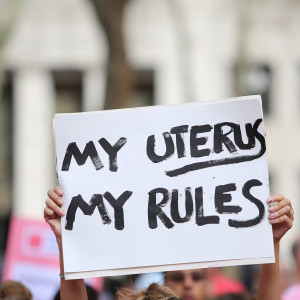March is Women’s History Month, an opportunity to reflect on gender equality, the valuable roles women play throughout society, and the way women contribute to building a more just nation even in the face of incredible obstacles. This month we will celebrate the phenomenal contributions of women like Sojourner Truth and Amelia Earhart, as well as living history makers like Lily Ledbetter, Dolores Huerta, Supreme Court Justice Ruth Bader Ginsburg and Wendy Davis.
While we recognize and appreciate the accomplishments by women like these, we also must acknowledge that much work needs to be done, particularly around reproductive health, rights and justice. The ability of women to access comprehensive reproductive health services, including abortion care, is becoming more and more difficult by the day.
In the last six years, nearly 300 restrictions have been passed at the state level to restrict abortion access. In 2015 alone, 17 states passed more than 50 abortion restrictions and 11 states slashed funding to Planned Parenthood. Texas — whose notorious Targeted Regulation of Abortion Provider (TRAP) law aims effectively to eliminate abortion care in most of the state — defunded Planned Parenthood and has yet to expand Medicaid, creating an even more precarious situation for Texan women seeking economic security.
What’s worse, these legislative actions are being taken under the guise of “protecting” women’s health. In fact, the state of Texas recently defended its TRAP law before the Supreme Court in Whole Woman’s Health v. Hellerstedt, arguing that fewer reproductive health clinics, fewer family planning resources and greater obstacles to reproductive healthcare is somehow “pro-woman.” In reality, these legislative efforts are dangerous and demeaning.
Already vulnerable women — particularly low-income women and women of color — struggle to protect their health and their families’ economic stability. Under the multitude of new restrictions, many of these women may now be forced to drive hundreds of miles one way, be required to endure a 72-hour waiting period or mandatory ultrasound, and even be subjected to a doctor reciting dubious medical information before they can receive abortion care. For those living in areas where Planned Parenthoods have been defunded, they are also curtailed family planning services, including effective long-acting reversible contraception. In Texas, unintended pregnancies are on the rise.
Importantly, the ability of a woman to plan and determine when and if she will parent is key to her economic security. In fact, second-wave feminists, particularly those in the middle class, are a testament to how access to contraception and abortion care reinforce economic security: the freedom to consult with their physicians and access services such as preventive care, family planning and prenatal care allowed these women to delay child bearing, pursue educational opportunities and invest in professional careers. Women who can pursue education and stay in the workforce increase their immediate and lifetime earnings.
Nearly one in three women in the United States will have an abortion — including women who are already mothers, who consider themselves religious affiliated or who are already struggling financially. But even though comprehensive reproductive health care may be technically legal, it is practically unavailable for far too many women — and that means that, in the name of “protecting women,” anti-choice legislators are stripping women of their constitutional rights and threatening their families’ economic security.
For all the progress women have made, women’s equality is still under siege. Women continue to run for office, gain ground in businesses and excel in academia, but the security of comprehensive healthcare and autonomy in determining when and if a woman will have children is becoming the right of a wealthy few rather than all women, regardless of their race, class or ZIP code.
Like in the years prior to making abortion access legal in the historic Roe v. Wade, when only four states permitted abortion prior to viability of the fetus and only 13 permitted it in limited circumstances, women’s lives and the opportunity to live up to their full potential are at stake.
This Women’s History Month, we must recommit to defeating the very real, insidious barriers to gender equality. In the interest of truly protecting women — mothers, sisters and daughters — we must demand a woman’s decision to parent is made with full self-determination in every aspect of her life.

